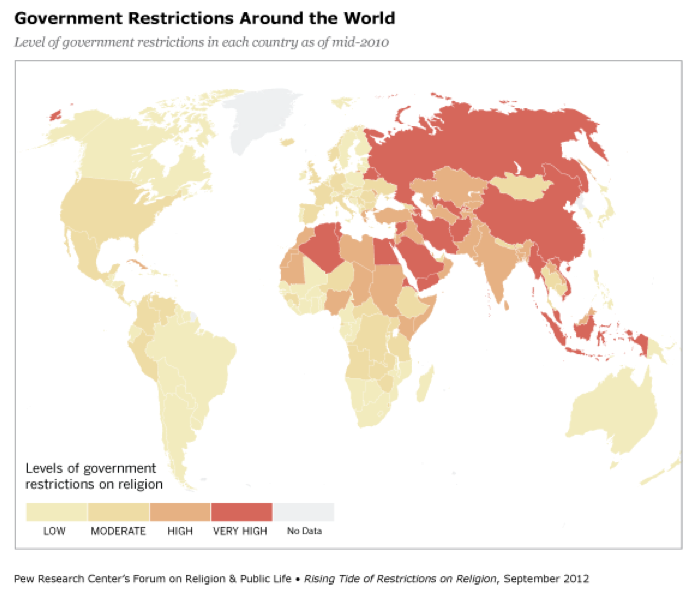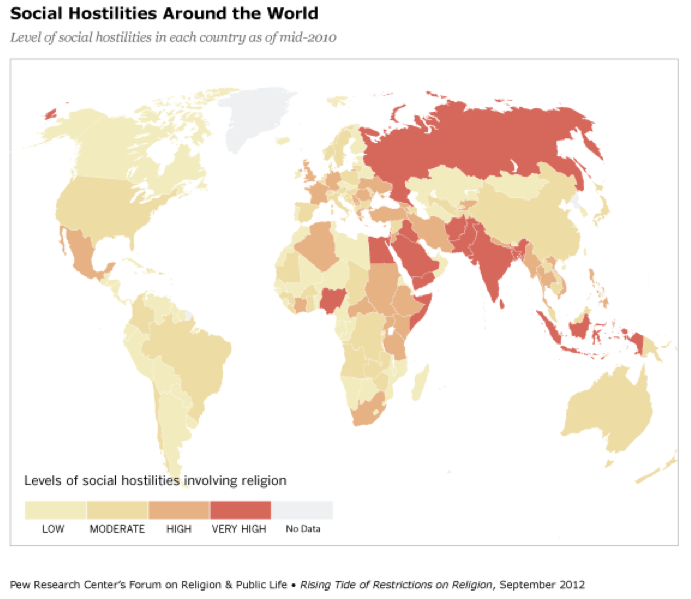A new report has found 75 per cent of the world’s population live in countries with restrictions on the free practice of their faith.
The report released this week from the Pew Research Center’s Forum on Religion and Public Life measures religious restrictions using an indexed scoring system for government restrictions and social hostilities, ranking countries on a “very low” to “very high” scale.
Overall, the report found an increase in the share of countries with high or very high religious restrictions, up from 31 per cent in 2009 to 37 per cent in 2010.
Christians, Jews and Buddhists experienced a four-year high in the number of countries in which they were harassed by governments and individuals. In 2010, Christians experienced government or social harassment in 111 countries. Muslims were harassed in 90 countries, Jews in 68 countries and Buddhists in 15 countries.
 Government restrictions increase
Government restrictions increase
The government restrictions index examines government laws, policies and actions that restrict religious beliefs (including banning particular faiths, prohibiting conversions, preaching limits or preferential treatment for some religions over others). From mid-2007 to mid-2010, the number of countries with “very high” government restrictions on religion rose from 10 to 18 countries. Afghanistan, Algeria, Azerbaijan, Belarus, Indonesia, Maldives, Russia, Syria, Tunisia and Yemen have all been added to the ‘very high’ list since 2007.
According to the report, government restrictions on religion were “high” or “very high” – and rising – in most of the countries that experienced political uprisings known as the Arab Spring about six months later in late 2010 – early 2011, including Tunisia, Egypt and Yemen.
The largest increases in government restrictions between 2009 and 2010 were recorded in Chad, the Democratic Republic of the Congo, Fiji, Nicaragua, Sri Lanka and Tunisia. Sixty-three per cent of countries had increases in government restrictions in that period.
 Social hostilities also on the rise
Social hostilities also on the rise
The Social Hostilities Index measures acts of religious hostility by private individuals, organizations and social groups, including mob or sectarian violence, harassment over attire for religious reasons and other religious-related intimidation and abuse.
Egypt, Nigeria, the Palestinian territories, Russia and Yemen were added to the list of countries with “very high” social hostilities, bringing the total up to 15 countries (up from 10 countries in mid-2007). Forty-nine per cent of countries had increases in hostilities from 2009 to 2010.
How Australia compares
According to the report, Australia’s government religious restrictions are on the increase. While Australia is categorized as “low” on government restrictions, there was a one-point increase between 2009 and 2010, lifting the index to 1.7. In comparison, the United States is “moderate” at 2.7, while closer to home Indonesia is listed as “very high”, at 8.6.
On the Social Hostilities Index, Australia is categorized as “moderate”, with an index rating of 2.1. Also “moderate” is United States at 3.4, while Indonesia is again ‘very high’ at 7.2.
Email This Story
Why not send this to a friend?

